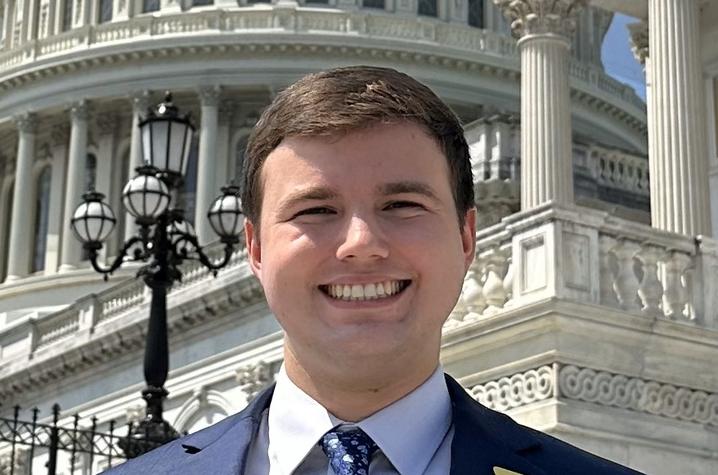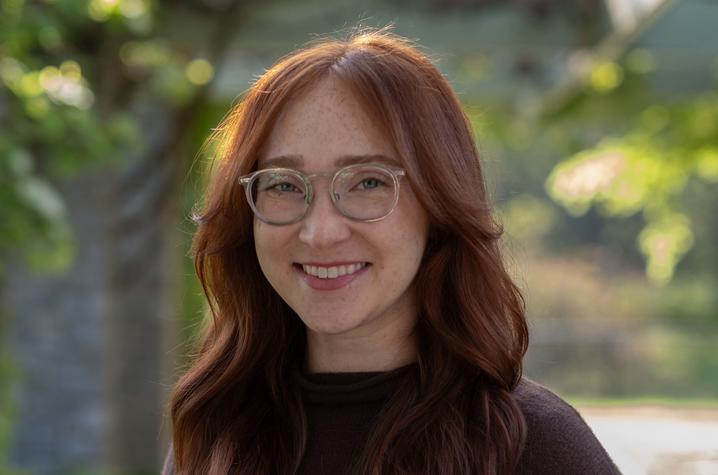UK Libraries recognizes 2 seniors for Excellence in Undergraduate Scholarship
LEXINGTON, Ky. (May 20, 2024) — UK Libraries is proud to recognize seniors Zachary Owen and Megan Quish with the 2024 Dean’s Award for Excellence in Undergraduate Scholarship. The annual prize celebrates exceptional and original scholarship in a traditional paper and a media or digital project, and is awarded to students whose research makes substantive and creative use of UK Libraries’ collections, services and resources.
Zachary Owen
Zachary Owen, who just graduated with a bachelor's in public policy from the Martin School of Public Policy & Administration, was awarded for his paper, “Homeownership and Mortgage Loans: How Important is a Conventional Loan?”
Conducted as his senior capstone project, Owen’s paper explores the relationship between mortgage loans and homeownership. During an internship last summer for the U.S. Senate, Owen was able to attend committee hearings, and was immediately struck by a hearing on predatory mortgage lending.
“I knew right away: this is my capstone,” he said.
In the fall, Owen began to explore the data, and was particularly struck by racial disparities in homeownership and mortgage denial rates.
“In 2021, there was a 29% disparity between Black and white homeownership,” said Owen. “This is the same disparity as during the 1960s, when banks were actively practicing redlining policies, and worse than in the 1940s. I was astonished to see that not only has there not been progress in this area, but we’ve actually moved backwards.”
Owen found that Black applicants are twice as likely to be denied a mortgage than white applicants.
“A lot of this is explained by racial disparities in credit scores,” said Owen.
His paper proposes introducing rental history as a new metric in credit scoring, which could boost the credit scores of renters by an average of 40 points.
“When renters miss a payment, their landlords typically report this to credit bureaus, but making payments on time isn’t reported. Mandating this reporting could improve the credit scores of renters across the country, and help renters secure mortgages so they can become homeowners.”
Owen relied on UK Libraries resources to review the historical and policy backgrounds of the problem – especially papers from the Journal of Public Administration & Management and the National Bureau of Economic Research – and to use statistics from the Federal Housing Administration and other government agencies to track racial disparities in homeownership and mortgage denial rates over time.
But it was research skills imparted by Business, Economics, & Government Information Librarian Jennifer Horne that proved to be the most useful library resource.
“Jennifer has come to every class I’ve had in the Martin School,” said Owen. “She taught us about where to start our research, all of the resources available to us, and most importantly, how to determine the credibility of resources by using the ‘CRAAP Test.’ For my project, I read a lot of studies from think tanks. You have to do a lot of horizontal reading – uncovering who founded these organizations, how they’re funded, and what their aims are – to see how objective or how partisan they might be.
“I saw Jennifer at a Martin School event and we recognized one another,” said Owen. “It’s so helpful to have a librarian that’s personally involved with the program. Her dedication to the program is obvious, and it really makes a difference for students when doing their research. I always knew I could reach out to her.”
Owen worked under the mentorship of Cory Curl, Ph.D., lecturer and director of undergraduate studies at the Martin School, while conducting research for his project.
“I’m thrilled that Zach took on one of the nation’s most urgent issues – housing – for his capstone policy analysis project,” said Curl. “As instructor for the fall capstone course, I was thrilled that he drew on his internship experience to design an analysis that will be useful in informing decisions facing policy leaders right now. His use of resources from UK Libraries helped him ground the work in data, evidence, and a solid understanding of the history and context that has shaped the current landscape. We are all very thankful to UK Libraries for providing ongoing, specialized support for UK students as they pursue policy research.”
Owen will return to UK in the fall to begin his master’s in public policy at the Martin School.
Megan Quish
Megan Quish, a senior in the UK College of Design’s School of Architecture, was awarded for her media project, “A House for Aging and Home for Community.”
Quish’s project envisions a multigenerational living community in Lexington’s Davis Bottom, a historically diverse and working-class community that was largely demolished in the early 2000s with the extension of the Newtown Pike. Quish’s project engages closely with the rich history and culture of the area in an attempt to rehabilitate what was lost.
“When I first began looking into Davis Bottom, I felt this incredible spark in me,” said Quish. “The more I learned, the more I wanted the research to go on.”
Quish sought out a holistic approach to her project, giving space to ideas that go beyond the typical concerns of architecture. She studied the area’s cultural history, zoning, planning and transportation policy, and situated her findings within the broader contexts and social currents of the last century, especially the dislocating effects of suburban sprawl on families, marginalized communities, and older generations.
“Our urban planning and policy choices mean that older people are increasingly getting left behind,” said Quish.
Quish also read a large body of secondary literature that considered the historical treatment of aging populations and global approaches to housing.
“This is where the library is so amazing,” said Quish. “Every new facet of the problem is another door, and every trail you follow leads somewhere else. The library allows you to follow all of these strands. This literature review was the heart of the project. This is a part that architecture education usually ignores.”
Following her literature review, Quish explored historical images of Lexington and Davis Bottom through several UK Libraries resources, including ExploreUK and the John C. Wyatt Lexington Herald-Leader Photographs.
“I would sit down on a Friday night, listen to the radio and just scroll through these amazing images,” said Quish. “There is so much to discover.”
Quish created a series of 36” x 72” collages that combined historical images with original textures and design elements, blending past, present and future into a vision of a place-based architectural project that will provide older adults with a high quality of life. Each collage includes a written component that draws on her research.
In many ways, Quish’s project is a demonstration of a way of researching.
“After compiling all of this research, I found that the best way to immerse in these ideas and think of them more deeply was to express them artistically. By working with visual aspects of the problem, and especially engaging with historic images, I was able to really process the historical development of this area and try to envision a better future.
“In our society full of new, shiny things and planned obsolescence, we aren’t influenced to value aging in our elders or environment,” said Quish. “Older generations are stigmatized, isolated, and forgotten. Part of this project is about creating a multi-generational community that integrates our elders back into society so that others can benefit from their knowledge, experience, and wisdom.”
Over the course of her project, Quish worked closely with Daniel Vivian, Ph.D., associate professor and director of the undergraduate certificate in historic preservation in the UK College of Design.
“I was thrilled to learn that Megan had received the award,” said Vivian. “It is a testament to the quality of her work, its creativity, and the variety of library resources she used to create it. Megan is a serious and dedicated student who combines creative and artistic skill with strong critical-thinking ability and sound research sensibilities. She is excellent at expressing ideas visually and also has the ability to dig into a subject deeply and think about it in ways that are more typical of the social sciences and humanities. This is a somewhat unusual combination of abilities, and Megan uses her strengths to good effect.”
Quish will graduate in December 2024 and plans to pursue graduate school in a field related to the takeaways of the Davis Bottom project.
“This became so much more than a research project,” she said. “It has catapulted my interest and started this massive growth of where I want to go, in continuing my education and professionally.”
As Dean’s Award recipients, Owen and Quish will each receive a $1,000 cash award, and their work will be published through UKnowledge, UK Libraries’ open access digital collection of scholarship created by University of Kentucky faculty, staff, students, departments, research centers and administration.
Owen and Quish were honored at the annual Spring Celebration on May 16 alongside this year’s recipients of the Medallion for Intellectual Achievement, the Paul A. Willis Award for Outstanding Libraries Faculty and the Dean’s Award for Outstanding Staff Performance.
As the premier research library in the Commonwealth, UK Libraries empowers lifelong learners to discover, create and connect by providing ever-expanding access to quality information and collaborating with academic and creative communities worldwide to advance knowledge, enhance scholarship and preserve the history and culture of the Commonwealth. More information about UK Libraries can be found on its website
As the state’s flagship, land-grant institution, the University of Kentucky exists to advance the Commonwealth. We do that by preparing the next generation of leaders — placing students at the heart of everything we do — and transforming the lives of Kentuckians through education, research and creative work, service and health care. We pride ourselves on being a catalyst for breakthroughs and a force for healing, a place where ingenuity unfolds. It's all made possible by our people — visionaries, disruptors and pioneers — who make up 200 academic programs, a $476.5 million research and development enterprise and a world-class medical center, all on one campus.







